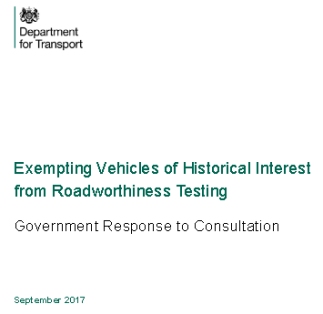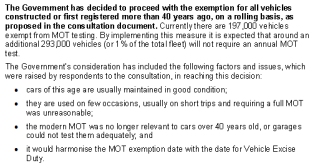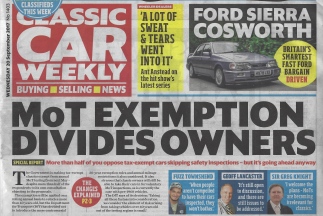British
Government to exempt 40 year old vehicles from MOT
Following a consultation
a few months ago on proposals to extend the MOT exemption, the Department of Transport
has released the UK Government's response to the consultation saying that "after
considering the responses, we have decided to exempt most vehicles over 40 years
old from the requirement for annual roadworthiness testing".
Posted:
170914
|  |
In an announcement today from The Government has decided to proceed with the exemption
for all vehicles constructed or first registered more than 40 years ago, on a
rolling basis, from the annual MOT test. Vehicles of of Historical Interest include
"Classic Cars" like the MGBGTV8. Government
announcement

"Substantially
modified" cars will not be covered by the exemption but there will be further
discussion over what that term means.
| 
The
"for and against" arguments CCW has in this week's edition are
interesting:
The case for the MOT exemption is made by Sir Greg
Knight (chair of the all-party parliamentary classic car group) who suggests "the
MOT test is becoming progressively irrelevant for historic vehicles which are
exempt from emissions testing anyway and tests are being performed by a young
tester who doesn't know the first thing about old cars". He then adds the
usual political two way handwash by adding "it doesn't mean people are free
to drive unroadworthy vehicles, they will still need to ensure they are in a roadworthy
condition and furthermore anyone who cannot maintain their own car can still submit
it for a voluntary MOT or safety check at their local garage".
The
case for retaining the MOT test or a similar annual safety check is made by
several classic car groups and by Fuzz Townsend the CCW master mechanic who writes
wonderfully clear and well illustrated pieces for CCW on various components on
our cars. | In
its latest issue on sale at newsagents today, Classic Car Weekly has as
its lead article a good review of the DfT document setting out the UK Government's
response to the consultation. In that document they said that "after considering
the responses, we have decided to exempt most vehicles over 40 years old from
the requirement for annual roadworthiness testing".
Although
the CCW headline is "MOT exemption divides owners" when you read pages
2 and 3 on the topic it seems many enthusiasts share the view that retaining the
MOT test for VED exempt cars was a desirable annual check and a contributor to
safety.
There are insurance considerations and CCW has a comment
from Marcus Atkinson of Hagerty who says they "can't insist on owners
(presumably people for whom they are providing motor insurance cover) having an
MOT, however we do require the car is kept in a roadworthy condition. When the
MOT exemption was first raised we very strongly insisted that people get an annual
check so there is an element of accountability in the event the vehicle is involved
in an accident. Our stance remains that, while you are not required to get an
MOT, it is a very good practice to get one - or at the very least - an annual
service to ensure the car is roadworthy". If ever I saw a comment that between
the lines indicated a classic car owner should continue to get an annual MOT test
and/or a service from a reputable service specialst who would include the safety
checks an MOT inspection would include and maybe more, that has to be it! The
reality is that with an insurance claim, assessors look at everything that could
be seen as a failure by the insured to comply with the terms of the policy and
they dig into the duty in most policies to maintain the car well and disclose
all modifications.
Update: In the CCW report,
the section with the comments from the Hagerty representative mentioned insurers
"can't insist on owners having an MOT if the vehicle is exempt as this
goes against legislation. However we do require that the car is kept in a
roadworthy condition". On contacting Chris Hunt Cooke his helpful response
was "I think what is being referred to is s.148
Road Traffic Act 1988 which renders void any purported restriction on the
third party liability in a policy relating to a number of matters, including the
condition of the vehicle. After all it would be very unfair if you were hit by
a driver and discovered he was uninsured because he had failed to get his car
through an MoT test. It applies only to the required legal cover under the Act,
an insurer would be free to restrict cover for damage to the insured vehicle".
Updated:
170923 |
|






